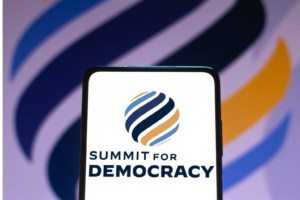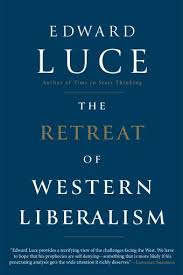Russia’s war in Ukraine has drawn Western allies closer together, but it has not unified the world’s democracies in the way U.S. President Joe Biden might have hoped for when the war began in February 2022. Instead, the last year has highlighted just how differently much of the rest of the world sees not only the war but also the broader global landscape, according to Foreign Affairs.
“Liberal democracy has proven a poor rallying cry,” says a Japanese official on the eve of the G7 Summit.
 Japan and other members of the international community should send legal experts to Ukraine to help deliver justice to victims of Russian war crimes, Ukrainian human rights activist Oleksandra Matviichuk told Nikkei.
Japan and other members of the international community should send legal experts to Ukraine to help deliver justice to victims of Russian war crimes, Ukrainian human rights activist Oleksandra Matviichuk told Nikkei.
“We are faced with unprecedented numbers of war crimes, and our national system is overloaded,” Matviichuk said in an online interview. A human rights lawyer by training, she heads the nonprofit Center for Civil Liberties, which was awarded the Nobel Peace Prize in 2022 [after receiving the National Endowment for Democracy’s Award the same year].
While the topic might not be on the formal, written agenda, or in any of the many programs and sideshows, foreign policy experts say the desire to keep the world’s non-aligned democracies firmly within the western tent will be a preoccupation of G7 leaders when they meet at the end of this week, CBC reports.
Former Canadian diplomat Colin Robertson said the challenge for leaders at the G7 summit and in the coming year will be to “consolidate the democracies” against rising authoritarianism at a time when emerging economies in the southern hemisphere don’t want to declare allegiance.
Russia’s unprovoked and brutal war in Ukraine is a turning point that demonstrates the importance of democratic alliance systems and supporting sovereignty and territorial integrity, notes analyst Jared Cohen, president of Global Affairs and co-head of the Office of Applied Innovation at Goldman Sachs. And yet ….
Dualistic frameworks like “democracies versus autocracies” do not have sufficient explanatory power for today’s more complicated, multi-aligned world. While appeals to democratic values resonate in many Western capitals and liberal societies, they do not always in countries that are critical partners for the U.S. and its allies in today’s global competition, he writes:
 For example, though India is the world’s most populous democracy, it trades and engages with autocracies like Russia, which provides a significant portion of New Delhi’s arms imports. Singapore was excluded from the U.S. State Department’s Summit for Democracy and remains deeply connected to China, yet joined the countries leveling financial sanctions against Russia for invading Ukraine. Vietnam is a critical U.S. partner in ASEAN, but China is its top trading destination.
For example, though India is the world’s most populous democracy, it trades and engages with autocracies like Russia, which provides a significant portion of New Delhi’s arms imports. Singapore was excluded from the U.S. State Department’s Summit for Democracy and remains deeply connected to China, yet joined the countries leveling financial sanctions against Russia for invading Ukraine. Vietnam is a critical U.S. partner in ASEAN, but China is its top trading destination.
Japanese officials and diplomats give a blunt assessment: the West is losing to China when it comes to outreach to the so-called global south, The Economist reports:
The G7’s relative economic strength has been declining, and with it, the pull of the international order it represents: the club-members’ share of global GDP in nominal terms peaked at nearly 70% in the late 1980s, but dipped to under 45% in 2021. In purchasing-power parity terms, the so-called BRICS grouping, of Brazil, Russia, India, China and South Africa, has already surpassed the G7’s share. Japanese envoys reckon that the West is failing to convince many developing countries of the benefits of the current order. They fret that ruling elites in many developing countries are starting to prefer dealing with China, which offers more stability, more roads and bridges and fewer lectures.
 “Liberal democracy has proven a poor rallying cry,” says one Japanese official. Japan hopes to tamp down the talk of a battle between democracy and autocracy in favor of strong G7 support for the rule of law, it adds.
“Liberal democracy has proven a poor rallying cry,” says one Japanese official. Japan hopes to tamp down the talk of a battle between democracy and autocracy in favor of strong G7 support for the rule of law, it adds.
As the United States increasingly engages in strategic competition with China and its authoritarian model, it must remember that it is free people and democratic societies who are its most valuable allies on the global stage, say the International Republican Institute’s Patrick Quirk and Santiago Stocker. Premature acceptance of sub-standard elections and willful ignorance of democratic backsliding may provide short-term bilateral gains, but in the long term serves to further separate the people in these countries from the United States, eroding affinity between our peoples, and increasing risks of conflict and instability that weaken current and future allies, they write for Just Security.
 The G7 still has value because all member countries are grappling with similar issues, according to former CFR fellow Stewart M. Patrick. “It’s sort of a manageable steering group of the West,” he says. “They’re a repository, an embodiment of common values and a similar rules-based approach to world order.”
The G7 still has value because all member countries are grappling with similar issues, according to former CFR fellow Stewart M. Patrick. “It’s sort of a manageable steering group of the West,” he says. “They’re a repository, an embodiment of common values and a similar rules-based approach to world order.”
Yet Japan’s measured approach has some downsides, The Economist adds:
Japanese officials are willing to talk about the rule of law “internationally but not internally”, notes Sahashi Ryo of the University of Tokyo. Keeping quiet on rights abuses or democratic backsliding for the sake of coalition-building risks allowing future problems to fester. As Mr Putin has demonstrated, dictators unconstrained by pesky checks and balances at home have an easier time launching illegal attacks on their neighbours.







